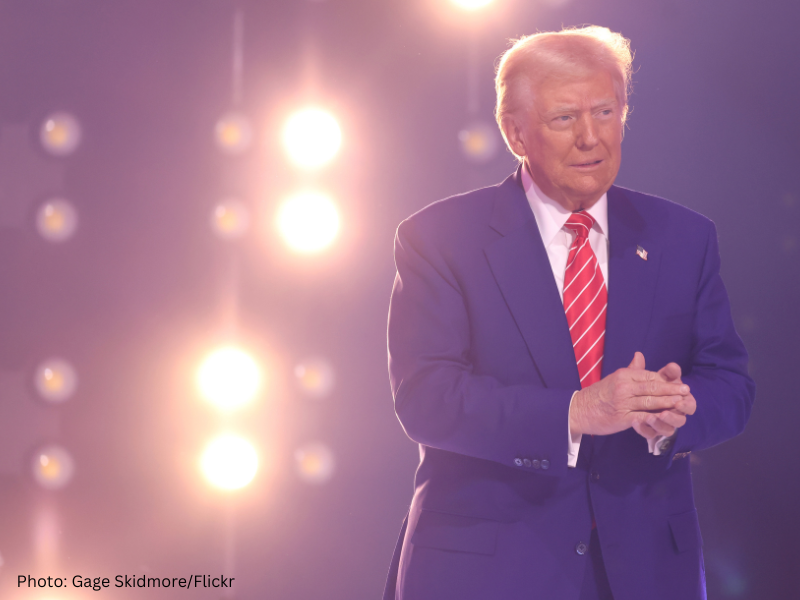President Donald Trump on Tuesday unveiled his budget for Fiscal Year 2018, which begins October 1. Mick Mulvaney, director of the Office of Management and Budget, says the budget eliminates 66 federal agencies or programs, will save $26.7 billion this year, and will balance the budget in 10 years. However, the $4.1 trillion budget spends about the same as last year, including $639 billion on defense, a $52 billion increase. The blueprint also predicts the nation’s economy will grow by 3 percent a year, a sharp increase from the average of the Obama administration of less than 2 percent.
Among the programs this budget cuts: Corporation for Public Broadcasting, National Endowment for the Arts, National Endowment for the Humanities, Low Income Home Energy Assistance Program (LIHEAP), HOME Investment Partnerships Program, National Wildlife Refuge Fund, Energy Star and Voluntary Climate Programs, Green Climate Fund, and Global Climate Change Initiative.
The following statements from policy experts at The Heartland Institute – a free-market think tank – may be used for attribution. For more comments, refer to the contact information below. To book a Heartland guest on your program, please contact Media Specialist Billy Aouste at [email protected] and 312/377-4000 or (cell) 847/445-7554.
“President Trump’s budget proposes many long overdue budget cuts, adding up to trillions in gross reductions from the baseline over the next 10 years. Trump proposes to balance the budget in 10 years entirely with those spending reductions, and no tax increases. The proposed budget in fact incorporates tax reform by sharply reducing tax rates, as well as repealing and replacing Obamacare, which would cut taxes by about $1 trillion over 10 years.
“Those policies, plus the spending cuts and President Trump’s deregulation, are tremendously pro-growth – which makes the budget’s increased growth assumptions actually quite conservative and likely to be exceeded in practice, as a long overdue, booming recovery from the 2008 recession finally ensues, correcting a central Obama failure. The end result of that would be to sharply reduce the national debt as a percent of GDP, down to 60 percent by the projections of Trump’s Office of Management and Budget.”
Peter Ferrara
Senior Fellow for Entitlement and Budget Policy
The Heartland Institute
[email protected]
312/377-4000
Mr. Ferrara is the author of Power to the People: The New Road to Freedom and Prosperity for the Poor, Seniors, and Those Most in Need of the World’s Best Health Care (2015), and The Obamacare Disaster (2010).
“Presidential budget proposals are best thought of as statements of principles, as opposed to actual economic plans, and President Trump’s proposal is no different. Balancing the federal budget in 10 years is an audacious goal, but this proposal demonstrates the president’s willingness to start down that road.
“Achieving that goal will, by necessity, require changing the largest driver of federal spending: entitlement spending. No amount of projected growth will hand-wave away that mathematical reality. At some point, either now or later, lawmakers will need to make tough choices, and perhaps break campaign promises, if it means coming to terms with the reality of federal debt by cutting or reforming entitlement program spending.
“The sooner this problem is dealt with, the easier it’ll be for everyone, and Trump’s proposal is a good starting place for lawmakers to use when figuring out how to do this. Lawmakers in Congress should work with President Trump to fill in some of the proposal’s question marks and unaddressed questions, but sticking to the proposal’s outlines where feasible would definitely restore the proper role and size of the federal government.”
Jesse Hathaway
Research Fellow, Budget and Tax Policy
The Heartland Institute
Managing Editor, Budget & Tax News
[email protected]
312/377-4000
“President Trump’s budget proposal shows great care in establishing that the costs of government programs reflect their claimed benefits. Items such as means-testing of assistance to farmers, state sharing of Supplemental Nutrition Assistance Program spending, and the option of states receiving block grants of Medicaid funding can make a big difference in federal spending over time, without forcing any big changes in what the government does. The proposed budget would also increase military spending, though not nearly on the level of what President Ronald Reagan did.
“All of that points to the conservatism of the budget proposal. It would not change things greatly, except for slowing the rate of growth of government. That, however, is a positive change – and one that the president’s political enemies will characterize as a dire threat to the nation’s future. That reflects the sad state of the nation’s current political culture.”
S.T. Karnick
Director of Publications
The Heartland Institute
[email protected]
312/377-4000
“We’ve long needed to get the country’s deficit and debt under control. This budget is a small start, but a start, nonetheless. Every member of the Senate and the House will have a pet project or program that he or she wants to protect from cuts. But let’s hope they will put the demands of the Constitution – as well as the people’s desire to limit the size of government and put the nation’s fiscal house in order – above the desires of the special interests served by pork-barrel, special-interest spending.
“Climate programs are a great place to start since they slow economic growth and have no measurable payoff. If it is not a core function of government, the government shouldn’t be funding it.”
H. Sterling Burnett
Research Fellow, Environment & Energy Policy
The Heartland Institute
Managing Editor, Environment & Climate News
[email protected]
214/909-2368
“President Trump’s proposed budget is a mixed bag for budget hawks. The president should be applauded for ending the wealth transfer from the middle-income citizens of the United States to wealthy dictators in developing nations in the name of the Green Climate Fund. However, his decision to increase military spending, and thus this budget’s failure to actually reduce overall government spending, is disappointing, especially if Trump is serious about enacting ambitious tax reform.”
Isaac Orr
Research Fellow, Energy and Environment Policy
The Heartland Institute
[email protected]
312/377-4000
“Ironically, President Trump’s proposed budget takes on risk by trying to play it safe with entitlement reform. Neither Social Security nor Medicare is sustainable in its current form. Maintaining the status quo on these programs is easy now, but it will soon be impossible.
“Reducing Medicaid spending is a viable approach to putting patients back in the driver’s seat of their health care decisions, as opposed to third-party interlopers blocking the path to innovative health care solutions for the country’s needy.”
Michael Hamilton
Research Fellow, Health Care Policy
The Heartland Institute
Managing Editor, Health Care News
[email protected]
312/377-4000









